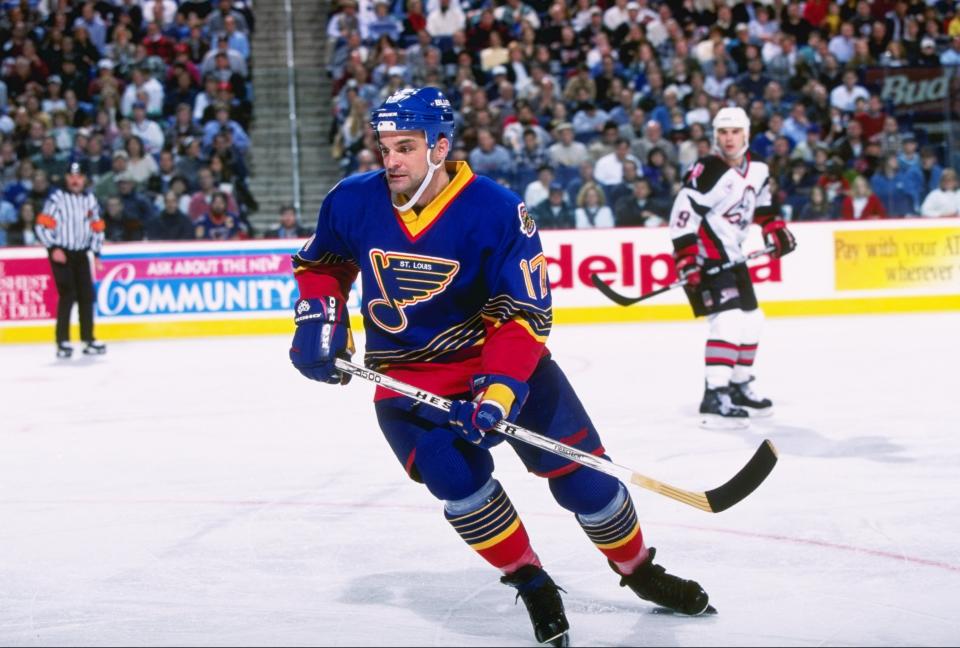Joe Murphy, former No. 1 pick, is homeless again and doesn't want NHLPA help

The No. 1 pick in the 1986 NHL draft has been homeless for more than two years now in a small town in western Ontario.
When Joe Murphy’s story first aired on TSN last summer, the details were difficult to take. The 15-year veteran scored 233 goals, made more than $13 million, won a Stanley Cup with the Edmonton Oilers in 1990 and won an NCAA title with Michigan State. His family suspected head trauma as a major reason for Murphy’s struggles.
Detroit Free Press reporter Jeff Seidel and photographer Eric Seals went out to Kenora, Ontario, last winter to spend time with Murphy. When they found out nearly a year later he was back on the streets, they went back out and the details aren’t any easier to digest.
The 51-year-old’s story involves mental health issues, questions about CTE, potential crystal meth use that’s rocked Kenora, and the refusal to accept help from dozens of people offering.
Murphy’s mental health issues, signs of CTE
Murphy took a big hit on the boards in 1991 while with the Oilers, and family told TSN last year that was when they started to notice changes and “erratic things.” He had multiple concussions in the sport.
Seidel describes his wild mood swings, from playful to unresponsive and catatonic, and storytelling from fascinating to confusing. He struggles with depression, difficulty thinking, short-term memory loss, emotional instability and suicidal thoughts, according to USA Today.
They are all symptoms associated with chronic traumatic encephalopathy (CTE), the progressive degenerative brain disease. It’s found in those with a history of repetitive brain trauma, meaning typically athletes but also military veterans, and is being studied in the NFL, NHL and women’s soccer.
Symptoms often begin years and decades after an athlete retires, per Boston University’s CTE Research Center, but can only be diagnosed after death by cutting into the brain.
Murphy was part of a failed concussion lawsuit against the NHL. Last November the NHL announced a $18.9 million settlement for more than 300 retired players. Each player will receive only $22,000 after the two-year battle, but it’s unclear according to Seidel if Murphy opted into it.
Players can also claim $75,000 in medical assistance, but Murphy will not go that route.
“But they have the NHL’s doctors look at me. I’m not signing up for that. I don’t want that extra money. I don’t want them to check me out.”
It’s one of the many offers of assistance Murphy has shot down.
Police, homeless shelter suspect crystal meth use
Those who see Murphy at shelters believe he’s now using crystal meth, which has hit the area hard.
Bernice Albany, the supervisor at the shelter Murphy stays, said the drug has sprouted up in the past six months and is a “constant battle.” When Murphy crashed on the floor of the shelter for an entire day — “he was out cold,” she said — the staff first noticed an abscess and an infection in his arm.
Albany believes of the estimated 200 homeless in the city, half are hooked on crystal meth. The police department said to try and curtail the use and impact, officers develop trusting relationships with the homeless community.
Murphy, for his part, will deny he uses drugs, then admit it, just to deny it again, Seidel describes. He said he takes drugs without a prescription for “a lot of aches and pains.”
Seidel details multiple times he asks if Murphy is doing drugs. Once, after the former player makes a secret exchange with a man, Seidel mentions that police suspect he is using.
“They have no account. They are speaking out of turn. I’d like you to ax that out. They are having their own difficulties of drinking and their own stupid-ience.”
Murphy is on a roll now, growing so excited that he is making up words.
“And they will judge me and tell me their lies against me!” he says. “Who are they to say?”
In regards to in incident with police and a court-ordered mental health evaluation last winter, he said he was “over-medicated.”
NHLPA tries to help Murphy
Murphy has received offers of help from many places, most of which he has spurned. The interaction with police was to get him the mental health attention he needed.
He has a $1,000 monthly pension, but it doesn’t last long.
“I’m out of it now,” he says of his pension on the ninth day of the month. “I go through it pretty quick at the start of the month if I’m partying or doing something and medications are coming in and (he laughs) it’s gone.”
In September, Glenn Healy, executive director of the NHL Alumni Association, and Adam Graves, a New York Rangers star who played with Murphy in Detroit, got him an apartment in Kenora. He insisted it was “going to end in failure” and left after a few months, Seidel reported.
The association has also set up spots with mental health and substance abuse treatment centers, but Murphy balked at the distance. When they found one closer, he still refused. Healy told USA Today any player can get help at any time.
Murphy doesn’t blame anyone for his life now and only asks for respect, but not money.
“I’ve made some good decisions and also some not-so-good decisions,” he says. “Right now, it’s been going kind of better for me.”
He said he likes to be alone, and others have noticed he typically isn’t in groups. He describes to Seidel how things are going to get better coming up with the NFL, NBA and NHL starting their seasons and the World Series in October.
“I think next month or two, I’m going to go on a roll and things are going to be good,” he told Seidel.
More from Yahoo Sports:


